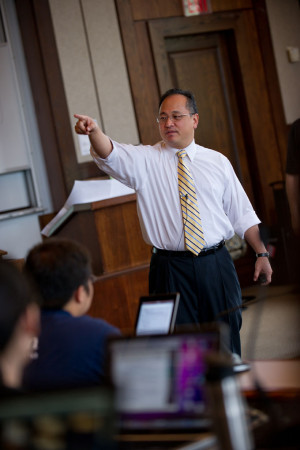Prof. Christopher Yoo discusses researching, teaching technology law & policy
 Christopher S. Yoo, the John H. Chestnut Professor of Law, Communication, and Computer & Information Science; Director, Center for Technology, Innovation & Competition.
Christopher S. Yoo, the John H. Chestnut Professor of Law, Communication, and Computer & Information Science; Director, Center for Technology, Innovation & Competition.
Professor Christopher Yoo is one of the world’s leading authorities on law and technology. The John H. Chestnut Professor of Law, Communication, and Computer & Information Science and the founding Director of Penn Law’s Center for Technology, Innovation & Competition, Yoo’s research focuses on how the principles of network engineering and the economics of imperfect competition can provide insights into the regulation of electronic communications.
He has been a leading voice in the “network neutrality” debate that has dominated Internet policy over the past several years, and his research delves into copyright theory as well as the history of presidential power. Yoo testifies frequently before Congress, the Federal Communications Commission, and the Federal Trade Commission.
Transcript
My name is Christopher Yoo. I am the John H. Chestnut Professor of Law. I also teach in the Annenberg School of Communication, and the School for Engineering and Applied Science. I also founded a center here called the Center for Technology, Innovation & Competition.
Shockingly, most people, citizens as well as policy makers, don’t really understand how the Internet works. And so a lot of my work is to draw that out, put it in plain English and show people what the implications of some of those structural decisions we made about the Internet actually are.
Engaging in Washington, D.C. has been a very interesting part of my work. It is a wonderful synergy between scholarship and policy. Working with other countries has been really exciting too, because you discover people in other countries don’t look at the world the same way Americans do. And to have to defend the way you look at things really has a wonderful effect of bringing you back to the very basic first principals of why the law is structured the way it is, and build a step-by-step explanation of why we do things the way we do.
I actually took a student group to Europe, though Germany and Brussels, to teach them about how EU makes technology policy. As many people know, the EU is becoming increasingly active - they had a big case against Microsoft, they blocked a number of mergers - EU competition policy has changed from something people could ignore to something that anyone who is doing technology oriented work has to pay attention to. I find that my student enjoy and benefit from personal experiences about how business people approach policy issues. Because ultimately, lawyers serve clients, there is some underlying interest, and I try to bring that element to the classroom in ways I think I bring it to live and make it a little bit more concrete.
There are a lot of architectural principles about the Internet that are thrown around such as modularity, the end-to-end argument, and layering – which I don’t think are really well understood at all. And so I’m trying to delve into them and digest the key technical concepts and make them accessible to policy makers, but also draw the key insights from them in ways I think can benefit policy.
I enjoy and actually do some additional work in that right now in how presidential power plays out, I am doing work on copyright and different theories. It’s just a wonderful time to be doing work in law and technology because it is this wonderful intersection between what’s going on with the underlying engineering, issues with the first amendment, issues of what types of government organizations should be running technology. And it’s moving so fast – one of the great things is that it is never boring.
Transcript edited for length.
